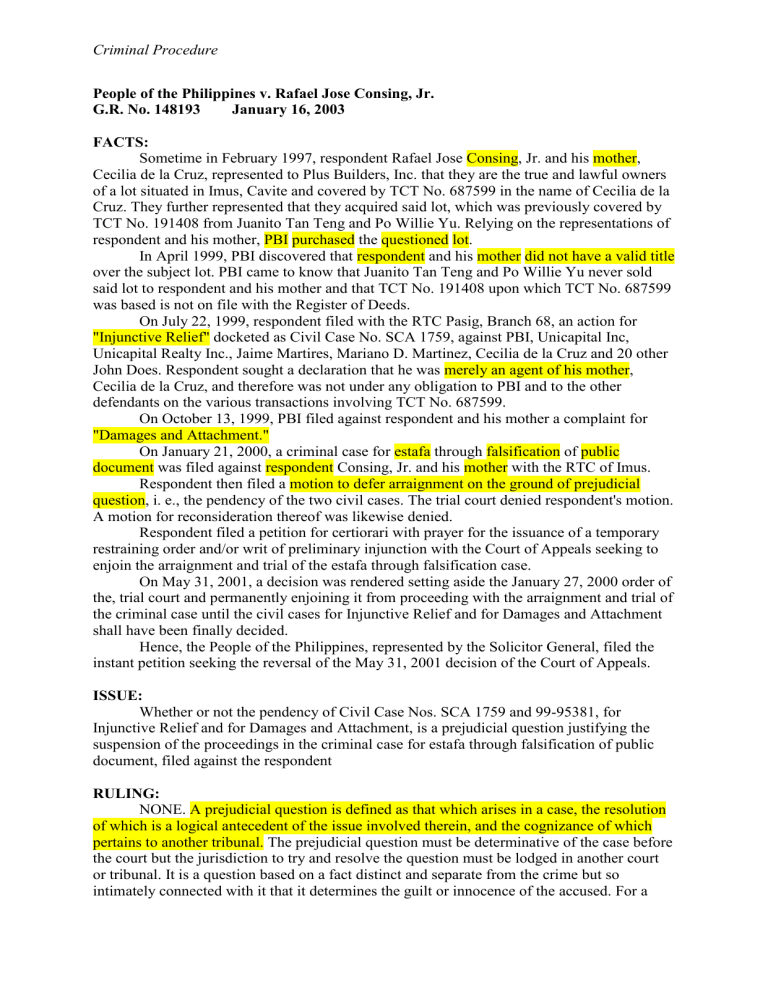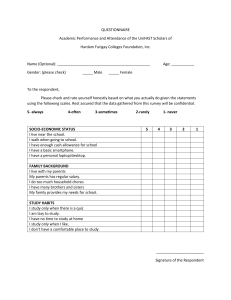
Criminal Procedure People of the Philippines v. Rafael Jose Consing, Jr. G.R. No. 148193 January 16, 2003 FACTS: Sometime in February 1997, respondent Rafael Jose Consing, Jr. and his mother, Cecilia de la Cruz, represented to Plus Builders, Inc. that they are the true and lawful owners of a lot situated in Imus, Cavite and covered by TCT No. 687599 in the name of Cecilia de la Cruz. They further represented that they acquired said lot, which was previously covered by TCT No. 191408 from Juanito Tan Teng and Po Willie Yu. Relying on the representations of respondent and his mother, PBI purchased the questioned lot. In April 1999, PBI discovered that respondent and his mother did not have a valid title over the subject lot. PBI came to know that Juanito Tan Teng and Po Willie Yu never sold said lot to respondent and his mother and that TCT No. 191408 upon which TCT No. 687599 was based is not on file with the Register of Deeds. On July 22, 1999, respondent filed with the RTC Pasig, Branch 68, an action for "Injunctive Relief" docketed as Civil Case No. SCA 1759, against PBI, Unicapital Inc, Unicapital Realty Inc., Jaime Martires, Mariano D. Martinez, Cecilia de la Cruz and 20 other John Does. Respondent sought a declaration that he was merely an agent of his mother, Cecilia de la Cruz, and therefore was not under any obligation to PBI and to the other defendants on the various transactions involving TCT No. 687599. On October 13, 1999, PBI filed against respondent and his mother a complaint for "Damages and Attachment." On January 21, 2000, a criminal case for estafa through falsification of public document was filed against respondent Consing, Jr. and his mother with the RTC of Imus. Respondent then filed a motion to defer arraignment on the ground of prejudicial question, i. e., the pendency of the two civil cases. The trial court denied respondent's motion. A motion for reconsideration thereof was likewise denied. Respondent filed a petition for certiorari with prayer for the issuance of a temporary restraining order and/or writ of preliminary injunction with the Court of Appeals seeking to enjoin the arraignment and trial of the estafa through falsification case. On May 31, 2001, a decision was rendered setting aside the January 27, 2000 order of the, trial court and permanently enjoining it from proceeding with the arraignment and trial of the criminal case until the civil cases for Injunctive Relief and for Damages and Attachment shall have been finally decided. Hence, the People of the Philippines, represented by the Solicitor General, filed the instant petition seeking the reversal of the May 31, 2001 decision of the Court of Appeals. ISSUE: Whether or not the pendency of Civil Case Nos. SCA 1759 and 99-95381, for Injunctive Relief and for Damages and Attachment, is a prejudicial question justifying the suspension of the proceedings in the criminal case for estafa through falsification of public document, filed against the respondent RULING: NONE. A prejudicial question is defined as that which arises in a case, the resolution of which is a logical antecedent of the issue involved therein, and the cognizance of which pertains to another tribunal. The prejudicial question must be determinative of the case before the court but the jurisdiction to try and resolve the question must be lodged in another court or tribunal. It is a question based on a fact distinct and separate from the crime but so intimately connected with it that it determines the guilt or innocence of the accused. For a Criminal Procedure civil action to be considered prejudicial to a criminal case as to cause the suspension of the criminal proceedings until the final resolution of the civil action, the following requisites must be present: (1) the civil case involves facts intimately related to those upon which the criminal prosecution would be based; (2) in the resolution of the issue or issues raised in the civil action, the guilt or innocence of the accused would necessarily be determined; and (3) jurisdiction to try said question must be lodged in another tribunal. 13 If both civil and criminal cases have similar issues or the issue in one is intimately related to the issues raised in the other, then a prejudicial question would likely exist, provided the other element or characteristic is satisfied. It must appear not only that the civil case involves the same facts upon which the criminal prosecution would be based, but also that the resolution of the issues raised in the civil action would be necessarily determinative of the guilt or innocence of the accused. If the resolution of the issue in the civil action will not determine the criminal responsibility of the accused in the criminal action based on the same facts, or there is no necessity that the civil case be determined first before taking up the criminal case, therefore, the civil case does not involve a prejudicial question. 14 In the case at bar, we find no prejudicial question that would justify the suspension of the proceedings in the criminal case. The issue in Civil Case No. SCA 1759 for Injunctive Relief is whether or not respondent merely acted as an agent of his mother, Cecilia de la Cruz; while in Civil Case No. 99-95381, for Damages and Attachment, the question is whether respondent and his mother are liable to pay damages and to return the amount paid by PBI for the purchase of the disputed lot. Even if respondent is declared merely an agent of his mother in the transaction involving the sale of the questioned lot, he cannot be adjudged free from criminal liability. An agent or any person may be held liable for conspiring to falsify public documents. Hence, the determination of the issue involved in Civil Case No. SCA 1759 for Injunctive Relief is irrelevant to the guilt or innocence of the respondent in the criminal case for estafa through falsification of public document. Likewise, the resolution of PBI's right to be paid damages and the purchase price of the lot in question will not be determinative of the culpability of the respondent in the criminal case for even if PBI is held entitled to the return of the purchase price plus damages, it does not ipso facto follow that respondent should be held guilty of estafa through falsification of public document. Stated differently, a ruling of the court in the civil case that PBI should not be paid the purchase price plus damages will not necessarily absolve respondent of liability in the criminal case where his guilt may still be established under penal laws as determined by other evidence. Moreover, neither is there a prejudicial question if the civil and the criminal action can, according to law, proceed independently of each other. 15 Under Rule 111, Section 3 of the Revised Rules on Criminal Procedure, in the cases provided in Articles 32, 33, 34 and 2176 of the Civil Code, the independent civil action may be brought by the offended party. It shall proceed independently of the criminal action and shall require only a preponderance of evidence. In no case, however, may the offended party recover damages twice for the same act or omission charged in the criminal action.

